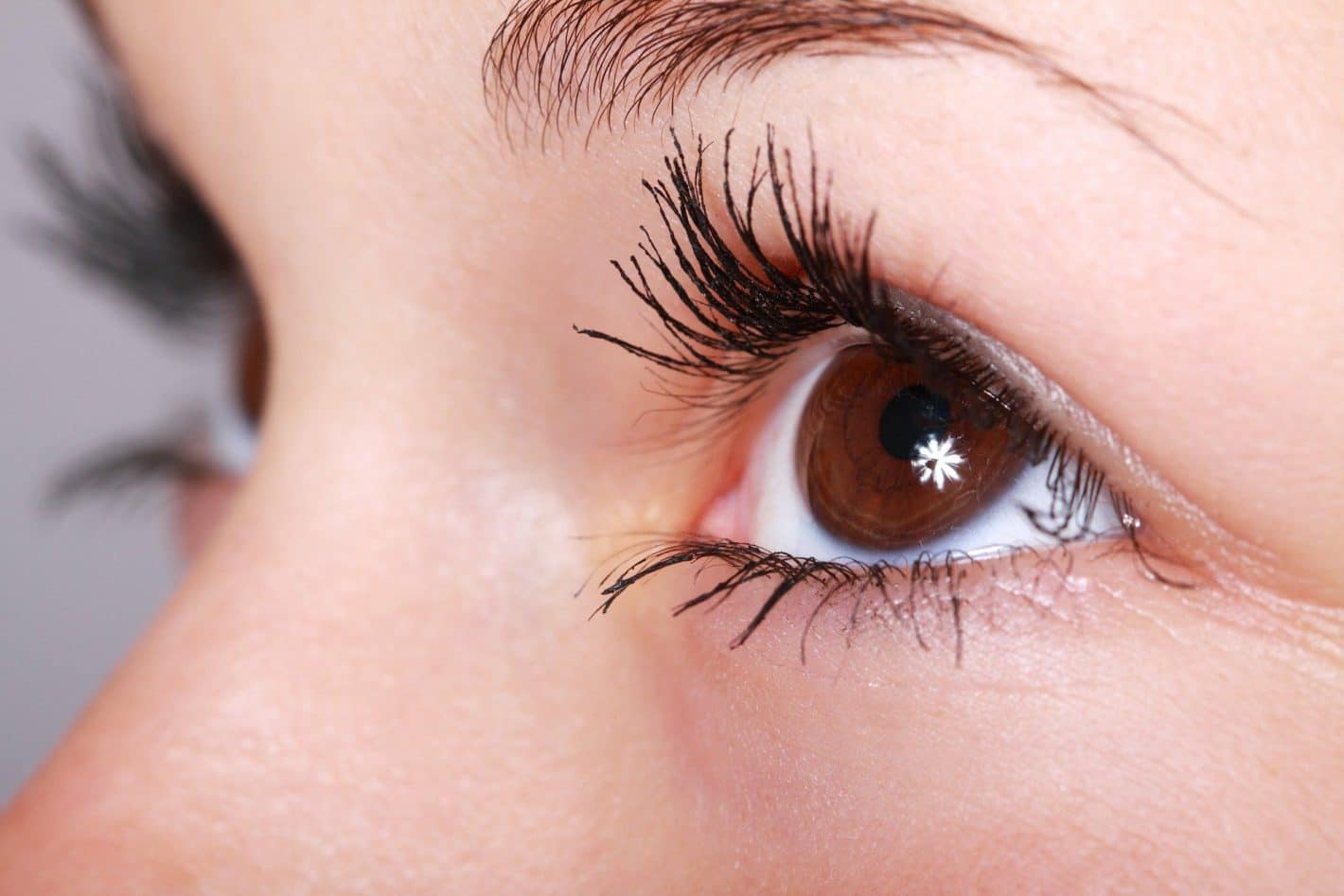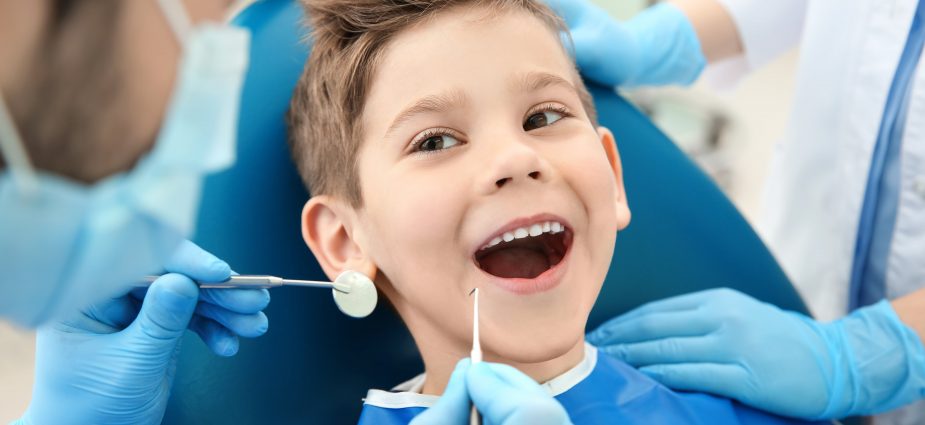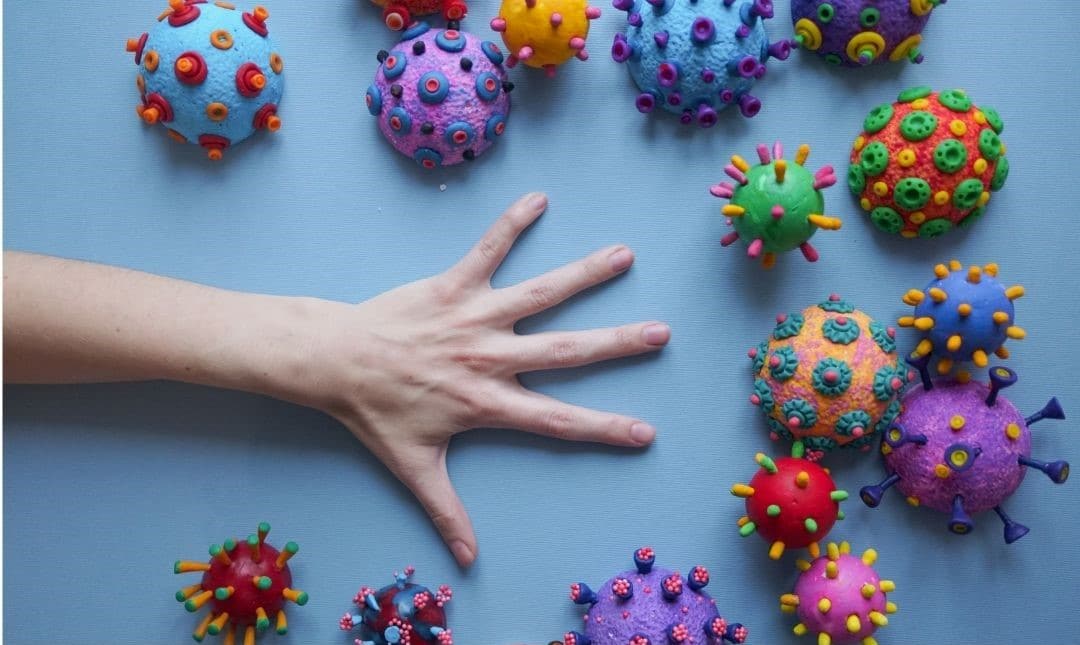A few months ago, India was hit with the second wave of the Corona Virus. The surge began in mid-March and the rate of infections rose rapidly, recording more than 400,000 daily cases on Friday, April 30th. Many cities reported a shortage of beds, oxygen, and medicine. Countless people have died without getting timely treatment. And now, there are risks to the health of recovering patients as well.
For the past 2 months, it has grown clear that India is fighting a battle not only against the second wave of COVID-19 but also a rare infection called Mucormycosis or “the black fungus.” There have been reports of an unprecedented increase in Mucormycosis cases in the last two months, especially among patients recovering from COVID.
What Is Mucormycosis?
Mucormycosis (also called “Zygomycosis” or “black fungal infection”) is a rare but serious fungal infection. It is caused by the fungi of order Mucorales, which is found in soil, plants, decaying fruits and vegetables, and even in the nose and mucus of healthy people. It affects the sinuses, the lungs, and the brain and can be life-threatening for people with reduced immunity. It’s important to have it diagnosed and treated as early as possible.
Who Is At Risk Of Contracting This Disease?
- People with weakened immune systems
- People who have Diabetes Mellitus
- People on a high dose of steroids, especially those who have had organ transplantation
- People undergoing cytotoxic drug therapy, chemotherapy, or radiotherapy for cancer
- People who have HIV/AIDS
- People recovering from or undergoing treatment for COVID
Why Are Covid Patients At Risk?
In recent months, there has been a rise in the number of people infected with Mucormycosis, particularly among those recovered from or undergoing treatment for COVID-19. Though the exact cause for the rise is still under investigation, it is believed that the trigger for the increase in cases could be the steroids used to control COVID symptoms. The steroids reduce the inflammation of the lungs caused by COVID and appear to help reduce the damage caused by the body’s immune system going into overdrive to fight off Coronavirus. But they also reduce immunity, which could lead to the patient contracting Mucormycosis. It could also be due to use of unclean masks and tubings used for delivering oxygen, or the derangement or increase of blood sugar levels. It is also possible that COVID 19 itself is responsible for reduced immunity, making patients more susceptible to this fungal infection.
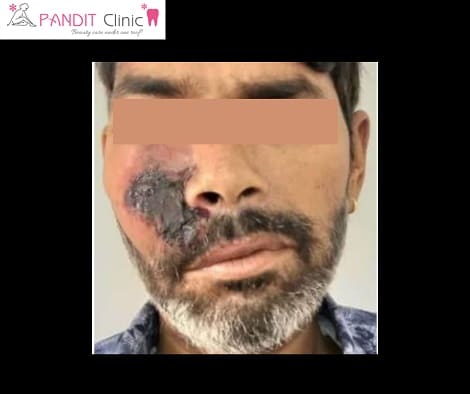
Mucormycosis is incredibly aggressive and has an overall mortality rate of 50%, so it is important to be on the lookout for the symptoms. If the infection is caught in the early stages it can be treated without too much risk to the patient.
What Are The Symptoms Of Mucormycosis?
- Swelling on the face, cheek, or lips
- Pain in the cheek or sinus areas
- Pain in the tooth or gums
- Mobility of teeth
- Gum abscess or boils
- Pus draining from gums
- Swelling or darkening of gums
- Ulcer on the palate
- Loss of sensation or heaviness over areas of the face or jaw
- Blackening or discoloration of the skin on the face
- Nasal congestion or sinusitis (inflammation of the tissue lining of the sinuses)
- Bad smelling nasal discharge or black colored secretions from the nasal cavity
- Pain in the eye or reduced vision
- Swelling in and around the eyes
- Reduced eye movements
- Headaches
- Facial muscle weakness
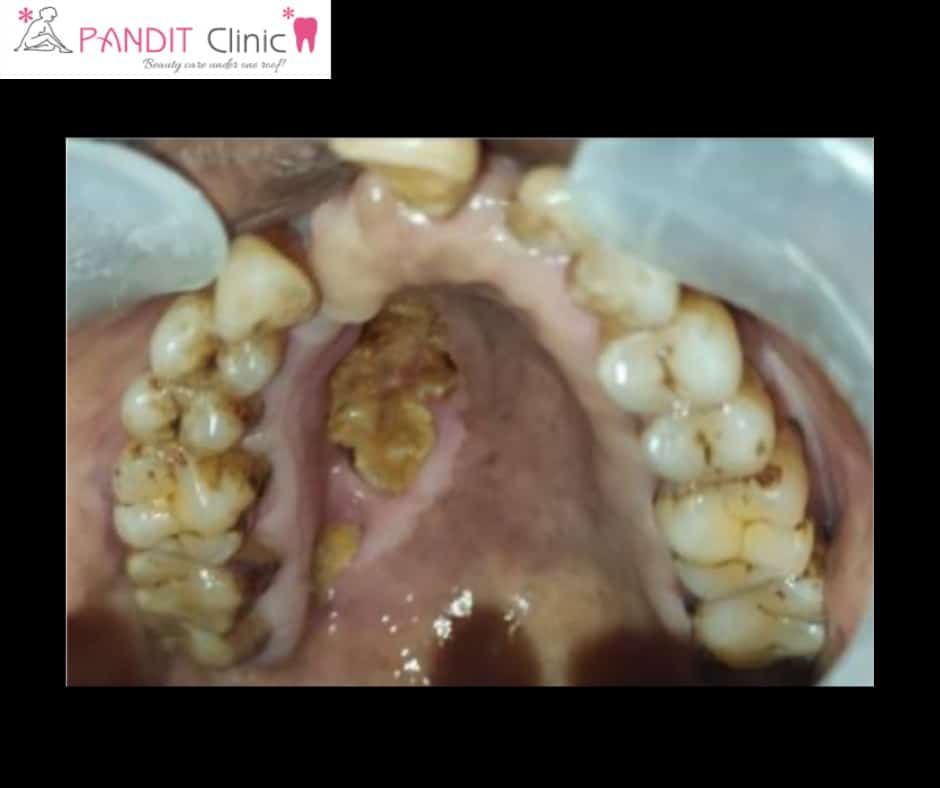
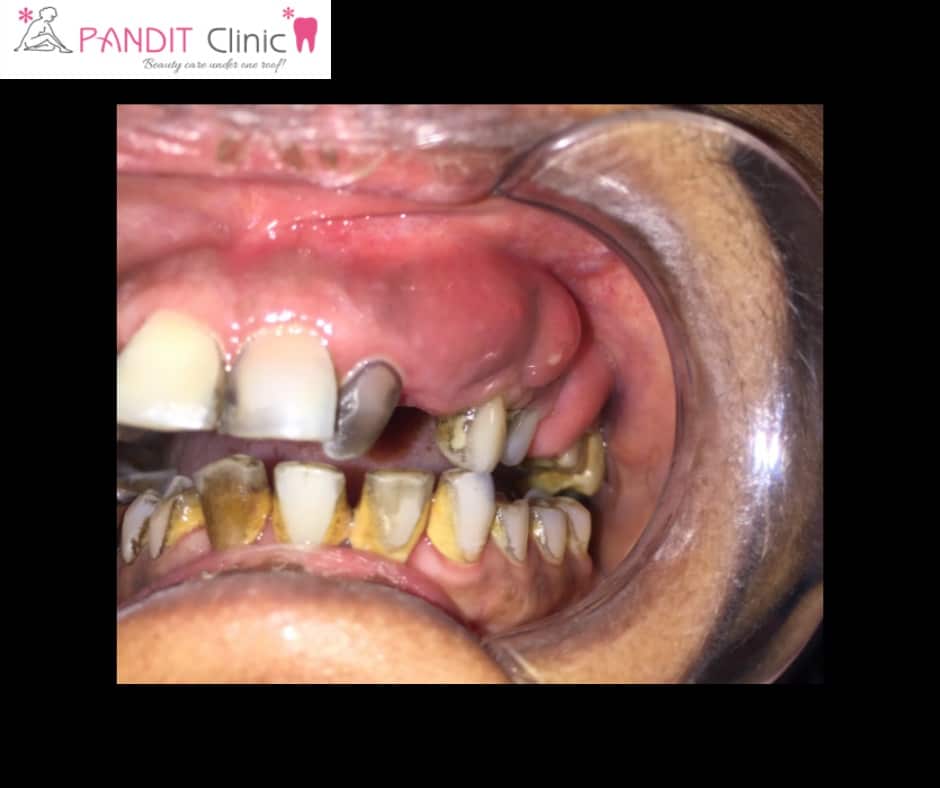
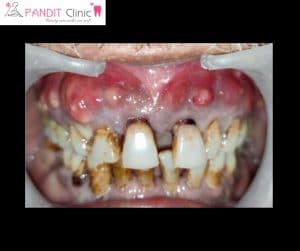
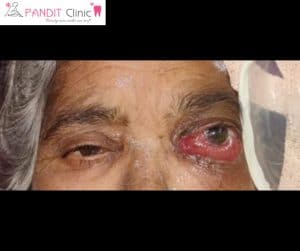
Patients who have recovered from COVID-19 recently (within 2-3 months) or who are currently undergoing treatment should keep a lookout for the above symptoms. If any occur or if the patient has reason to be worried, he/she should consult with a doctor immediately. It is best to get diagnosed as soon as possible to prevent future complications.
How Is Mucormycosis Diagnosed?
The treatment of Mucormycosis involves oral and maxillofacial surgeons, ENT specialists, eye specialists, infectious disease specialists, and if necessary neurologists or neurosurgeons. If a patient is concerned about being infected by this fungal infection, they must go to one of these specialists for consultation as early as possible.
If Mucormycosis is suspected, multiple examinations of the patient are conducted.
- First, a clinical examination of the patient is conducted.
- Then the ENT specialist conducts a nasal endoscopy and the eye specialist examines the eyes of the patient.
- Sometimes, a CT or MRI of the patient is also requested.
- Finally, the diagnosis is confirmed after a careful examination of a biopsy taken from the infected site.
Dr. Vikram Pandit is a visiting consultant and a consultant oral and maxillofacial surgeon at some of the top hospitals and clinics in Pune like Poona Hospital and Research Centre, Ratna Memorial Hospital, Pandit Clinic, and KEM Hospital. His priority is the patient’s health and safety, and so he conducts very careful and thorough examinations before giving a diagnosis. His experience gives him the qualifications to quickly judge if a patient needs immediate and urgent treatment.
To book an appointment with Dr. Vikram Pandit, click here
How Is Mucormycosis Treated?
- Hospital Admission: - Admission to the hospital is always necessary if a patient has Mucormycosis. For a successful treatment, a team approach consisting of multiple specialists is essential. It is also important to control underlying illnesses like diabetes while treating the patient.
- Anti-Fungal Treatment: - Depending on the nature and the spread of the infection, the patient is given anti-fungal drugs through the IV for 2-4 weeks. These drugs can be toxic to the kidney. So, it is very important for the doses to be carefully controlled and monitored.
- Surgical Treatment: - Sometimes, depending on the spread of the fungal infection, surgical intervention may be necessary. The infected part of the jaw is removed along with the infected teeth by the oral and maxillofacial surgeon. If the infection has reached the eyes, the infected eye may have to be removed by the eye specialist. The ENT cleans the sinuses using special endoscopic procedures.
- The surgical procedures may have to be repeated and the anti-fungal procedures may be needed for an extended time period (from weeks to months), depending on the severity of the disease. Mucormycosis is a very aggressive infection. It spreads rapidly along the nasal cavity and the sinuses to the bones of the skull. If the infection reaches the brain, the course of the disease becomes unpredictable and may lead to death.
There has been an increase in cases of Mucormycosis in the past 2 months. The disease has begun to affect people who did not have any previous medical condition that would have them susceptible to the “black fungus” like diabetes. The rapid spread of the infection means that if the patients are diagnosed too late, it may lead to severe complications post-treatment like blindness. It can even lead to death. The best way to beat the disease is through early diagnosis and treatment. Thus, it’s important for all patients recovering from COVID to keep an eye on themselves. Seek help immediately if you observe any of the symptoms of Mucormycosis or are concerned about your oral health contact Dr. Vikram Pandit at Pandit Clinic here.
Meet the Doctor
BDS, MDS Oral & Maxillofacial Surgeon
Dr. Vikram is a visiting consultant and consultant oral and maxillofacial surgeon at the top hospitals in Pune like Poona Hospital and Research Centre, Ratna Memorial Hospital, Pandit Clinic and KEM Hospital. Dr. Vikram has done clinical fellowship in craniofacial surgery with focus on surgery for cleft lip and palate deformities, orthognathic surgery and surgery for sleep related disordered breathing (SRDB). He has trained for advanced management for Facial Trauma, from Taiwan. He has also attended various seminars and done workshops related to Oral and Maxillofacial Surgery. Dr. Vikram is also a co- author of a chapter for a textbook. He has been invited as a speaker for number of conferences in India as well as Internationally.
You Might Be Interested In

How Is General Anesthesia Used In Pediatric Dentistry?
Much of Pediatric dentistry involves treating dental problems in children and young adults. It’s a field of dentistry that includes diagnosis, prevention, and treatment for
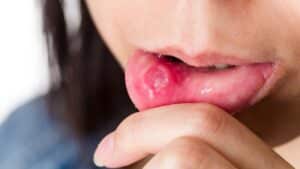
Oral Ulcers In Children: Causes And Treatment
Explore the causes, symptoms, and treatments for oral ulcers in children. Ensure your child’s oral health with expert advice on managing and preventing these painful sores




